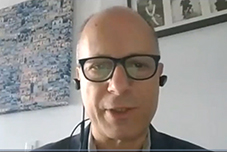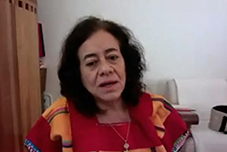Inclusion in the Time of COVID-19: Confronting slavery’s legacy of racism together
28 May 2020 – The transatlantic slave trade remains one of the gravest crimes against humanity that the world has ever seen. But it is not just a dark footnote in human history – because we are still living with its shameful legacies. The COVID-19 pandemic starkly exposed those legacies – including racism, inequality and the vulnerabilities of people of African descent across the globe.
That was the focus of today’s virtual discussion, entitled “Inclusion in the Time of COVID-19: Confronting Slavery’s Legacy of Racism Together.” Organized by the United Nations Remember Slavery Programme and the United Nations Educational, Scientific and Cultural Organization (UNESCO) – in the context of the International Decade for People of African Descent (2015-2024) – the webinar focused on how COVID-19 has exacerbated health conditions linked to structural racism and caused people of African descent to suffer disproportionately.
After Tabue Nguma from UNESCO’s Social and Human Sciences Sector welcomed the audience of 380 participants, opening remarks were delivered by Maher Nasser, Director of the Department of Global Communications’ Outreach Division. Mr. Nasser stated that, in multiple countries, higher death tolls from COVID-19 were being recorded in black communities. But that was not a coincidence. Drawing clear links between the transatlantic slave trade and ongoing structural racism, he noted that disproportionate numbers of people of African descent lived in densely populated communities; had unequal access to food, water and secure housing; and were crowded into prisons. Calling for solidarity, he said that, in order to build back better, it was necessary to dismantle racist structures, reform racist institutions, and confront slavery’s legacy of racism together.
The webinar’s four expert panelists were: Lisa Coleman, Senior Vice President for Global Inclusion, Diversity and Strategic Innovation at New York University; Yoann Lopez, Project Manager in charge of Memory, Racism and Antisemitism for the City of Bordeaux; María Elisa Velázquez, Mexican anthropologist and former President of the UNESCO Slave Route Project’s International Scientific Committee; and Canadian hip-hop artist and lecturer Webster.
Dr. Coleman explained that the need for labour in the New World had been the driving force behind the transatlantic slave trade, which resulted in the forced migration of an estimated 17 million Africans to the Americas. People with different skills were captured because of their knowledge and sent to specific regions to provide free labour. Even after emancipation in the United States, the work of African Americans continued to be undervalued through the enforcement of the Black Codes, which were used to “contain and constrain” the labour of black people post-slavery. Hundreds of years later, these disparities continued to exist and had resulted in people of African and Hispanic descent being disproportionately employed in service industries and earning considerably less than their white counterparts – leading to a differential impact on these communities from COVID-19. Connected to this was the global image making of people of African descent, who were “blamed and shamed for their own disease and… treated as criminals”. Dr. Coleman concluded by highlighting the importance of the Sustainable Development Goals and partnerships between the international community and black communities globally to address intersectional disparities and the facts surrounding COVID-19.
Addressing the role of mayors and cities in fostering inclusion, Mr. Lopez spoke about policies implemented by the City of Bordeaux to address inequality and ensure that the transatlantic slave trade was not forgotten. Since March 1998, when thousands of descendants of enslaved Africans had come to Bordeaux to mark the 150th anniversary of the abolition of slavery, the City of Bordeaux had established a day of commemoration, adopted a memory action plan and acknowledged the magnitude of its role in the transatlantic slave trade. Bordeaux had been one of the largest slave-trading ports in France, but today, it was fully engaged in the fight against racism, discrimination and marginalization of people of African descent. He said that Bordeaux, a member of UNESCO’s International Coalition of Inclusive and Sustainable Cities (ICCAR), offered free medical care to all people, including those of African descent. His city was therefore a good example, as it had used integration, inclusive memory and universal health care, to address any vulnerabilities that black communities might face in the COVID-19 context.
Speaking from Mexico City, Dr. Velázquez highlighted the enormous disparities, exploitation, historic discrimination and racist stereotypes, that had grown out of the transatlantic slave trade. Noting that the concept of race had been introduced to justify the enslavement of Africans, she added that, although scientists had proven that race was not grounded in genetics, the notion was still used by many societies to differentiate between groups of people. One thing that stood out during the COVID-19 pandemic was the link constantly being drawn between race and disease. While it was difficult to calculate how many people of African descent were getting sick and dying from COVID-19 in Latin America and the Caribbean, it was clear that many black communities – in such countries as Brazil, Colombia and Ecuador – did not have the necessary health infrastructure to tend to the sick. Last year, Mexico had recognized Afro-descendants in its federal constitution and as a category in its census. Since COVID-19 had arrived when the census was not complete, it was difficult to get race-based statistics. However, Afro-Mexicans continued to lack access to medical care and to experience discrimination during the pandemic. She called for solidarity in the face of COVID-19.
Webster highlighted the relatively unknown history of slavery in Canada. Many Canadians, for example, did not know that the first enslaved African had arrived in Quebec in 1629 from Madagascar. He also explained how racist thinking from the time of slavery had been embedded into societal norms and still shaped modern medicine. Examples included the notion that black people experienced less pain, which led to them often being prescribed inadequate pain medication in Canada and the United States. He also referred to a 19th century diagnosis of enslaved people’s desire to flee captivity as a mental illness called drapetomania. Noting that structural racism led to real health impacts, he stressed that social distancing was a privilege that not everyone could afford. Currently, there was no data in Canada on the effects of COVID-19 on people of colour. But social justice activists were advocating for that. Meanwhile, Montreal had emerged as a COVID-19 epicenter in Canada, and the neighbourhood that was suffering the most was North Montreal, which also happened to be the poorest and most racially diverse in the country. Webster explained how he had used hip-hop to tell the little-known history of slavery in Canada – as a way to “democratize knowledge.” He concluded by saying that it was not race that had created racism but rather racism that had created race.
Panelists agreed that understanding the transatlantic slave trade was essential in order to address the COVID-19 pandemic and break down barriers caused by racism. This sentiment was echoed in closing remarks by Angela Melo, Director of Policies and Programmes in UNESCO’s Social and Human Sciences Sector, who pointed to UNESCO’s efforts to promote education about slavery and address slavery’s legacy of racism through its Slave Route Project, its Master Class against Racism, and the ICCAR network of mayors, which now had 500 members across the globe engaged in discrimination-free development.
According to a survey conducted after today’s webinar, 83 per cent of respondents said the discussion had increased their understanding of the transatlantic slave trade’s legacy of racism; 84 per cent said it had increased their understanding of how COVID-19 had exasperated inequalities that had long existed for people of African descent; and 66 per cent said they would apply what they had learned to their work or studies.
The webinar was moderated by Brenden Varma, Manager of the United Nations Remember Slavery Programme.

Lisa Coleman, Senior Vice President for Global Inclusion, Diversity and Strategic Innovation, New York University, New York

Maher Nasser, Director, Outreach Division, Department of Global Communications, United Nations, New York

María Elisa Velázquez Gutiérrez, Former President, UNESCO Slave Route Project International Scientific Committee, Mexico City

Mr. Yoann Lopez, Project Manager in charge of memory, racism and antisemitism, City of Bordeaux

Ms. Angela Melo, Director of Policies and Programmes, Social and Human Sciences Sector

Webster, Hip-hop artist and lecturer, Montreal